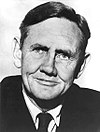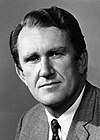No.
|
Portrait
|
Name
|
Party
|
Took office
|
Left office
|
Notes
|
| 1
|

|
Barend Moen-Haig
(1909-1989)
|
Conservative Party
|
1962
|
1967
|
Remained leader of the Conservative Party until his retirement in 1975.
|
| 2
|

|
Prainsis Ó Leannáin
(1926-1972)
|
Liberal Progressive Party
|
1967
|
1972
|
Elected President of Finntaire in 1967, becoming the first President of the recently united Liberal Progressive Party. Brought in controversially tough stances against organised crime and radicalism, but also expanded social security, enabled provincial representation reform, and implemented civil rights for indigenous Finntairans. Won re-election in 1972 but was assassinated some months later at the hands of Ronald J. Ross in 1972, who was believed to have been working for the Ballysidney Mafia.
|
| 3
|

|
Lionel Cabot
(1910-1998)
|
Liberal Progressive Party
|
1972
|
1977
|
Became President of Finntaire after the assassination of Prainsis Ó Leannáin, serving out the remainder of his term. He focused on increasing connections to the ... Community, and was known for his abrasive and cautious attitude, preferring not to "rock the boat" on implementing more reforms. He refused to run for re-election in 1977 and the Progressive National Party was defeated.
|
| 4
|

|
Michael Northey
(1918-1993)
|
Conservative Party
|
1977
|
1982
|
Michael Northey led the Conservative Party to their election victory in 1977 on a platform against the wasteful spending of the Liberal Progressive Party. Continued to grow Finntairan influence in the ... Community. Was notably more liberal than some members of his party, which led to arguments over policies. Lost the 1982 election to the PDP.
|
| 5
|

|
Mághnus Ó Leannáin
(1931-2009)
|
Progressive Party
|
1982
|
1987
|
Brother of former President Prainsis Ó Leannáin, and leader of the Progressive Party since the division of the Liberal Progressive Party in 1979. Drew on many of the ideals of his brother while implementing more social democratic policies, expanding Medicare, and raising the minimum wage. Faced a sluggish economy, growing inflation, and decreasing job rates at the end of his first term, hurting his re-election chances and resulting in his defeat in 1986 to Oliver Rush of the Conservative Party
|
| 6
|

|
Oliver Rush
(born 1940)
|
Conservative Party
|
1987
|
1992
|
...
|